- Home
- Mark Chadbourn
The Scar-Crow Men soa-2
The Scar-Crow Men soa-2 Read online
The Scar-Crow Men
( Swords of Albion - 2 )
Mark Chadbourn
Mark Chadbourn
The Scar-Crow Men
PROLOGUE
Past the Candlewick street plague pit they race, by the red crosses blooming on doors like spring poppies, and the words God have mercy daubed on house after house. Breath burning in their chests, they stumble and fall in the night-dark alleys only to haul themselves up on shaking legs to run again.
They are not consumed by terror of the sickness that has left London sweating in a feverish vision of its own demise, with florid images of blackened skin and blood haunting every thought. It is fear of what lies at their backs, sweeping through the filthy streets, caught in the glow of candles, like moths, eyes blazing with fierce passions. The ones who have footsteps like whispers, whose passing is a cold breath on the back of the neck.
‘Do not look behind. Do not slow,’ Christopher Marlowe yells to his companion.
His desperation rings off the wattle walls that press in on either side. In the heat of the late spring night, dark patches of sweat stain his grey doublet. His short Dutch cloak has been torn by a nail and his flat-top hat lost several streets back.
Marlowe is a playwright, one of the most famous in England, but he has other work, secret, dirty and dangerous. In intermittent shafts of moonlight, Marlowe’s face appears too pale, his features etched with a profound sadness that is surprising in a man still in his twenties. His eyes are dark against his almost translucent skin, the clipped black beard and moustache as wispy as the first face hair of a boy.
Beside him, Jack Wainwright is like a Kentish oak. Though almost ten years older than his companion, with a beard streaked with grey, he could easily shoulder a full beer barrel at the Mermaid Tavern on Cheapside. The whites of his eyes show clearly beneath his heavy brows. Scared, he ignores Marlowe’s order and glances back.
Lights dance in the dark, drawing closer.
‘We could hide and take them by surprise,’ Wainwright says with a wavering voice that contains no enthusiasm. Under his working clothes, a loose coat over a shirt belted with cord, his sweat is cold.
‘Would you take that risk? You are strong, but you are not a fighting man. And I, God help me, can do damage only with a quill,’ Marlowe gasps. At the crossroads, he pauses, tries to steady his pounding heart, takes his bearings and then moves on.
Careering into the middle of a street near ankle-deep in dung, the two men skid to a halt a hand’s-breadth from stamping hooves and creaking wheels. Eyeing them from beneath the brim of his battered hat, the driver spits an oath through the filthy cloth tied tightly across his mouth. He cracks his whip and urges the lumbering horse on. It is the death-cart. In the back, the wrapped bodies are stacked like cordwood, leaking fluids on to the roadway with every jerk and rattle. For a moment, Marlowe and Wainwright stare after the wagon as it disappears into the night.
With a rough shove, the older man urges his companion on. ‘We shall not outrun them.’
‘No. It is too late for us now,’ the playwright mutters under his breath. ‘Perhaps it was always too late.’
The route between the filthy hovels is as black as pitch, but Kit has run it many times to avoid the constables and beadles, the drunken cutpurses and the low men to whom he owes money. Continuing west, they pass the open shutter of a cellar crammed to bursting with the poor, huddled in the dark in the reek of their own sweat. Pale faces glance up from the gloom, eyes wide with hopelessness.
Marlowe picks a path through a maze of stables and stores until he sees the spire of St Paul’s silhouetted against the night sky. The cathedral would be open for sinners to find sanctuary. He urges Wainwright on.
‘We can bolt the door,’ he says, clapping a hand on his fellow’s shoulder. ‘Pile the pews against it.’ Although he knows it will do little good.
The fugitives tumble into the candlelit cathedral and slam the heavy door behind them. The echoes rumble like thunder through the cavernous interior of the grand old building. Their breath ragged, they inhale the ghost of incense. With trembling fingers, they draw the bolts lightning-fast, a moment before something crashes against the oak with the force of a carriage. The two men are hurled across the worn flagstones, the impact knocking the wind out of them. Whatever is outside continues to pound the door with a steady, deafening rhythm.
Thoom. Thoom. Thoom. A funeral drum.
The blood hammers so loud in his head, Marlowe can barely think, but after a moment he gathers himself. ‘Quick! Help me!’ he calls. Wiping the moisture from his brow, he scrambles to his feet and runs to the nearest pew. It is too heavy for him to lift alone, but Wainwright grasps his end and raises it effortlessly. The two men haul it across the door, and then return for two more.
‘’Twill not delay them long,’ Wainwright shouts above the booming echoes. His face is red, his sweat vinegar-sharp in the air.
‘It will buy us a moment or two. That is all I need.’ Fighting back his queasy dread, Marlowe, followed by Wainwright, runs down the nave’s great length. The locals call it Paul’s Walk and it is nearly six hundred feet long, making the cathedral the third-longest in Europe, so the clergy boast. Past the scars of the destruction inflicted by Old Henry’s dissolution and the Chantries Acts they race, under the vaulted roof and past the triforium which gives the cathedral a grandeur that makes Kit wish he was a Christian with a God who would listen to his pleas. He fixes his attention on the stained glass of the great rose window at the east end, hoping to see a glimmer of dawn, although he knows in his heart there is still a good half-hour to go.
In the sanctified interior, Jack Wainwright has calmed a little, though he winces at every crash against the door. ‘What were they doing in that house? Did we really see that … that terrible thing?’ he asks, kneading his hands. Marlowe knows his companion hopes for a denial. When none comes, Wainwright crosses himself and blinks away tears of dread.
‘Put it out of your mind. We have little time left to us. Spend it on whatever pleasant thoughts you can summon.’ Distracted, Marlowe continues to search along the nave.
‘Pleasant thoughts!’ Wainwright exclaims, lifting his hat to run his fingers through sweat-plastered hair.
Marlowe tries to ignore the sour taste of failure. He recalls the hope he felt as he readied himself for the mission at sunset, but as in all his dealings with the Enemy he had also prepared himself for the worst. Now it is a matter of make-do and hope once again. Against his hip, the sack weighs heavily. Will its contents be enough to turn the tide of events?
As the crashes against the great oak door grow louder, he glances back and knows it will not hold much longer.
Grasping a candlestick, the playwright drives the shadows back until he finds the object of his search in the north aisle of the choir. A wooden plaque has been fastened to a pillar to mark the grave of Sir Francis Walsingham. A rush of memories surprises Marlowe with their intensity. Though there had never been any love lost between him and England’s former spymaster, he still thinks the funeral was a sad end to a powerful man.
He recalls standing at that same spot three years ago amid the tight knot of men: Will, Burghley, a handful of others, heads bowed, faces solemn. Candlelight and shadows, the sweet smell of incense, the muttered prayers of the priest rustling all around. The Queen, whom the great man had served so well, was noticeably absent. There had been none of the pomp and ceremony that usually greeted the passing of such a dignitary, no cathedral draped in black, no procession of the curious public to see the interment. The funeral was at night, out of sight of the masses, as if it was a guilty secret to be quickly hidden away. They blamed the quiet affair on the huge debts that hung over Wa
lsingham at his death, but Marlowe knows the truth.
The flickering candle drips hot balls of wax on to the plaque with its banal Latin inscription outlining what is public knowledge of the spymaster’s life. The playwright laughs bitterly at the volumes of truth that have been omitted.
Dropping to his knees, he finds the unmarked stone slab beside the final resting place of his former master’s son-in-law, Sir Philip Sidney. He sees that the other great men buried in the cathedral have towering alabaster monuments, but Walsingham’s grave is as he lived his life, unobtrusive, a shadow, easily missed.
From the sack tied to his side, Marlowe draws a pot of ink and, with his quill, begins to deface the tomb.
In the beginning was the Word, he writes.
Wainwright squats beside him, babbling, ‘Why are we here? Why do you do this?’
The pounding on the door suddenly ceases. The silence that follows is somehow worse.
‘Is there nothing that can save us?’ the big man pleads. ‘I could turn myself to God and pray for forgiveness.’
‘If you feel there is some good in it, then do it.’ Kit’s tone is warm and he hopes it will comfort, but he sees a shadow cross his companion’s face and knows he has accepted the suggestion too readily. Wainwright begins to shake until Marlowe puts a steadying hand on his shoulder.
‘We should go our separate ways. That at least gives one of us a fighting chance,’ the playwright urges in a quiet, calm voice.
Wainwright nods. ‘I have no regrets, Master Marlowe. I have done good work for the Queen and our country, though I have not always been a good man.’
‘I have no regrets, either. What will be, will be.’
The harsh grating of bolts being slowly drawn echoes along the vast nave. Yet there is no one near the door. Marlowe and Wainwright spring to their feet and shake hands before racing back along the nave, Wainwright to the north door, Marlowe to the south. Crouching behind a stone pillar, the playwright can just make out the vague form of his colleague in the gloom on the far side of the cathedral.
The west doors crash open. The pews fall aside as if they are autumn leaves. Footsteps echo off the flags. Whispery voices chill the blood.
Marlowe knows he should run, but he has to see. Keeping to the shadows around the pillar, he watches the pools of candlelight along the nave. Grey shapes flit around the edges of the illumination. Then, after a moment, one of them walks into full view, stands and looks around.
Naked to the waist, his skin has the colour of bone, his cadaverous head shaved and marked with blue and black concentric circles. Black rings line his staring eyes as he searches the shadows of the cathedral. Leather belts criss-cross his chest to secure the axe and sword on his back. His name is Xanthus.
Ice water sluices through Marlowe, and recognition.
In the candlelight, a cruel smile plays on the lips of the new arrival, and he takes from a pouch at his hip a silver box large enough to contain a pair of shoes. It is ornately carved. Marlowe thinks he glimpses a death’s-head on its lid before Xanthus places the box on the flagstones and flips it open.
Run, the voice in the playwright’s head insists, but he is in thrall to the curious sight. Why a box? What does it contain?
For a moment the only sound is the wind whistling through the open doors. Then a faint rustling begins. Marlowe spies movement at the edge of the dark interior of the box, one small shape wriggling, then another, then three. And from its depths streams a swarm of black spiders, each one as big as a man’s hand. Too many for the size of the box, it seems.
A gasp comes from the other side of the cathedral. Wainwright, you fool, the younger man thinks.
Xanthus’ lips pull back from small, pearly teeth, he glances into the shadows where the man hides and in a black tide the spiders wash towards the unseen spy. A moment later a cry of agony echoes up to the vaulted roof and Wainwright staggers into the candlelight, tearing at his skin. The creatures are all over him, biting. The pale figure only watches and grins.
Marlowe clasps a hand to his mouth in horror. He sees raw flesh on his companion’s face, and blood flowing freely to pool around the man’s shoes. Screams fill the vast space of the cathedral. However much Wainwright rips at the spiders, he cannot stop the agony. Wet bone gleams on the doomed man’s head, and the back of his hands.
The screams subside. He staggers like a man in his cups, and falls to his knees, still slapping at his skin weakly. And when he pitches forward on to the cold stone, the creatures still feed.
Covering his face, Marlowe tries to drive the hideous vision from his mind.
This is only the start, he thinks.
Gripping the cold iron ring, the playwright throws open the south door and bolts into the warm night. His laboured breathing echoes off the walls of the houses, punctuated by the beat of his Spanish leather shoes on the dried mud. The thunder of blood in his head destroys all thoughts, and it is only when he is racing south through the winding streets towards Blackfriars that he realizes fortune is with him; but not with poor Wainwright.
He forces aside a tide of regret and grief and guilt. Will always told him he would never thrive as a spy because he felt too keenly. Now he understands that the past no longer matters, nor do his failings and dashed hopes. Only the future is important, and the slim chance that he can do something to avert the coming tragedy.
After a few moments the playwright hears his pursuers on the trail once more. Time is short.
Marlowe reaches the muddy banks of the slow-moving Thames, black under the dark sky, and he thinks of the River Styx. He smells wet wood and vegetation, and hears the symphonic creaks of straining ropes on the boats moored along the river’s edge. Across the water is his own personal heaven: Bankside, and the gardens surrounding the Swan Theatre and the Rose, and the stews and dives where he can be the man he wants to be, away from the scrutiny and demands of powerful people.
Fearing he is too late, the playwright searches along the sticky path between Blackfriars and Baynard’s Castle. But then he hears the stamp of hooves and follows the sound to find a young man dozing beside his horse, swathed in a brown woollen cloak. Kit studies the sleeper briefly, seeing the clear skin and slender frame and innocence, and suddenly he feels so very old. Gently, he shakes the young man awake.
‘Tom? Thank you for coming, but there is now a need for urgency,’ the spy says.
Tom rises, stretching. He is taller than Marlowe, his eyes as grey as the winter sky, his hair blond, falling over his ears and to the nape of his neck. ‘I thought you would not come. What is your wish? The horse?’ he asks sleepily. He doesn’t notice the playwright’s dishevelled state.
‘That is for you, to get as far away from here as you can, and quickly.’ Marlowe looks on his young friend with affection, and a rising sadness, and he tries to keep the edge of fear out of his voice.
A howl echoes only a few streets away. The playwright cannot be sure if it was made by a beast or something that had the shape of a man. The Enemy can never be considered men, he thinks with a pang of bitterness. They have no compassion, no joy or love.
From the sack at his side, Marlowe pulls a thick sheaf of papers, tied with string and sealed with red wax. ‘Tom, listen to me. You must deliver this to my good friend Will Swyfte.’
‘England’s greatest spy?’
Marlowe smiles wryly. ‘Yes, that is indeed how he is known. But first, and quickly, I must write a note to accompany the work.’ He retrieves his quill and the pot of ink.
A troubled thought distracts him and he peers deep into Tom’s face, searching for familiar signs, knowing it is not enough. Then he puts one hand at the back of the young man’s neck and pulls him into a deep kiss. When he breaks away, he stares into Tom’s eyes; it is still not enough, but he has to hope.
‘What is wrong?’ Tom asks. ‘You are not yourself.’
Marlowe laughs at that.
Hearing his pursuers closing in upon their position, his hand trembles as he g
rips the quill. Too much is at stake, and he dare not write plainly. But too obscure and Will will not understand his warning. In the end, he can only trust in his friend’s intellect.
I fear this may be our last communication, my dear, trusted friend. The truth lies within. But seek the source of the lies without, he scrawls. Trust no one. He underlines this last.
Quickly, he folds the letter and slides it under the string before handing the complete bundle to Tom. By this time, the young man is alarmed by his friend’s actions. He senses their finality.
‘You will come with me?’ Tom asks. ‘My horse will carry two a short distance.’
‘There is nothing I would like more than to ride away with you, good Tom, and recapture those honeyed moments that made me so happy. But I fear it would mean your death. Now, be away, and fast.’ Marlowe hears the faintest tremor in his voice, but he hides it quickly, seals it with a smile.
He kisses Tom again, and turns to the boats so his young friend will not linger. He allows himself one quick glance back when he hears the hoofbeats drawing away, and a moment of sadness too, and then he scrabbles to free the mooring rope of the nearest waterman’s vessel.
Whispers roll along the river bank. Shadows emerge from an alley.
Lurching into the cold shallows, Marlowe feels the mud sucking at his shoes as he launches the boat into the current and drags himself on board. Loud splashing erupts behind him, but the current takes Marlowe away just quickly enough. Shadows flit along the water’s edge, keeping pace.
Ahead, the first gleam of dawn lights the horizon. The playwright looks to the bank and sees the grey forms melt back into the darkened streets.
Marlowe feels no relief. He lies back in the boat, letting the current take him where it will. This life is already over for him, he knows that. There is no escape.
Somewhere a killer lurks in plain sight, with a plan that threatens to engulf England in a rising tide of darkness. He listens to the water sloughing past the boat and hears in it the whispers that have haunted him since he made the first shocking discovery. Two words repeated in a rhythmic chant.

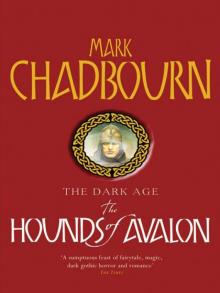 The Hounds of Avalon tda-3
The Hounds of Avalon tda-3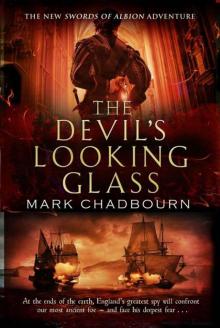 The Devil's Looking-Glass soa-3
The Devil's Looking-Glass soa-3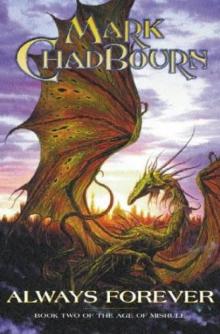 Always Forever taom-3
Always Forever taom-3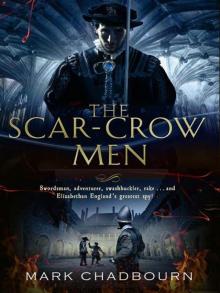 The Scar-Crow Men
The Scar-Crow Men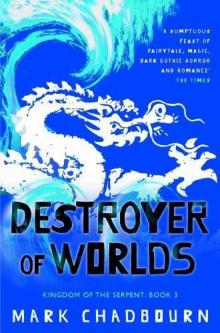 Destroyer of Worlds kots-3
Destroyer of Worlds kots-3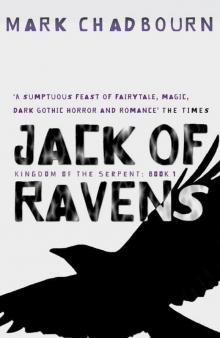 Jack of Ravens kots-1
Jack of Ravens kots-1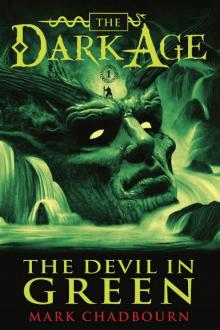 The Devil in Green
The Devil in Green World's End
World's End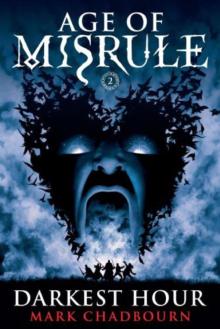 Darkest Hour (Age of Misrule, Book 2)
Darkest Hour (Age of Misrule, Book 2) Destroyer of Worlds
Destroyer of Worlds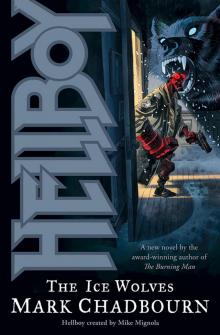 The Ice Wolves
The Ice Wolves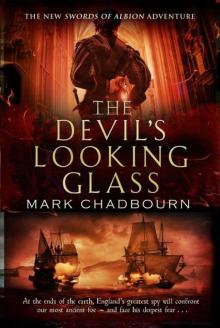 The Devil soa-3
The Devil soa-3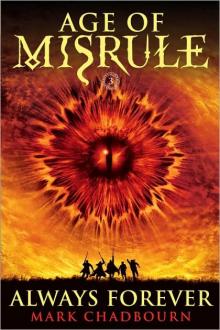 Always Forever
Always Forever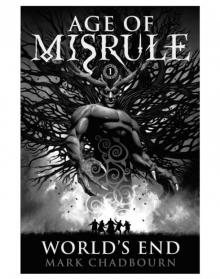 World's End (Age of Misrule, Book 1)
World's End (Age of Misrule, Book 1)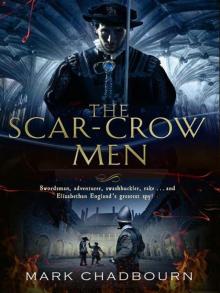 The Scar-Crow Men soa-2
The Scar-Crow Men soa-2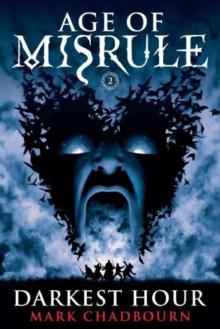 Darkest hour aom-2
Darkest hour aom-2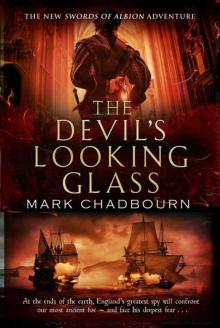 The Devil's Looking-Glass
The Devil's Looking-Glass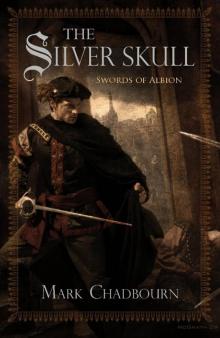 The Silver Skull
The Silver Skull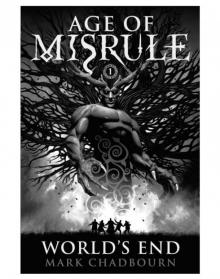 World's end taom-1
World's end taom-1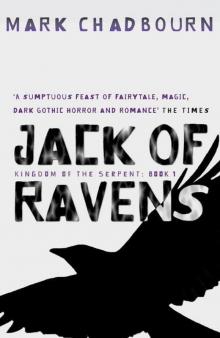 Jack of Ravens
Jack of Ravens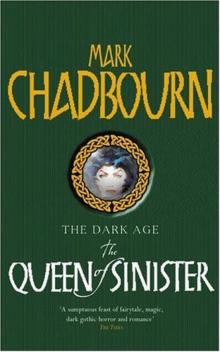 The Queen of Sinister
The Queen of Sinister